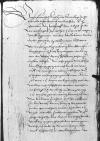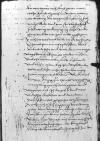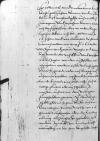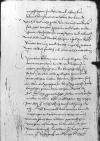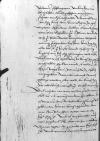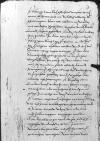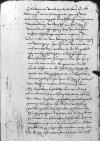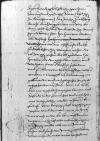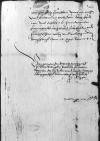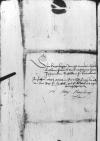E(uer) L(ieb) ⌊⌋ dat(um) ⌊Heilspergk⌋ denn 2 May haben wir empfangen, / inn welchem E(uer) L(ieb) unns von wegen ires ⌊burggravenn⌋ bruders / des erbarnn unsers lieben getreuen ⌊Mattessenn vonn Eldittenn⌋ vor unnsere genedige erbietung danckenn thun / dergleichen auch zuwissenn begeren, / wie lange wir das verboth des ausschiffenns stehenn zu lassenn bedacht etc. Nun wehr gegenn unns solcher dancksagung gantz ane noth / dan do wir unns auff E(uer) L(ieb) ansuchenn in allem zimblichenn und billichenn wilferig ertzeigenn konnenn, / darin sol unns E(uer) L(ieb) freunt unnd gutwillig erfinden, / wollenn auch beschehenem unnserm erbiethenn nach als baldt der bericht ann unns gelanngt E(uer) L(ieb) unnsers gemuts meinung, / darnach sich ⌊der vonn Eldittenn⌋ zurichtenn, / entlichen eroffenen. /
Inn dem verboth / der ausfurung des getreides habenn wir in nachstem unserem schreibenn E(uer) L(ieb) unnser bedenckenn zuerkennen gegebenn / unnd solchs derhalben / das dormit die vorstossennden unnd vor augenn schwebendenn wurungenn, / welche sich leider bei der armuth altzu seher unnd beschwerlich in werck ertzeigenn dem  BCz, 1606, p. 442 gemeinenn guthenn zum bestenn etwas gemil[...] hidden by binding⌈[...][...] hidden by binding⌉ wordenn. / Aus denselbenn erwegungen, welche nu mehr durch diese wÿtterung, / die zum wach[...] hidden by binding⌈[...][...] hidden by binding⌉ nicht vast tuglich, / auch dem, das / das winter getreidt schir ann allenn ortenn vorsitzenn thut, / zu dem das ann vielenn orternn gantz wenig oder auch nichts gesehett hat konnenn werdenn. / Unnd wir durfftigenn menschenn in dem wie in allem andernn zur sommer sach der benedeiung Gothes unnd seines mildenn und gewichsigenn weters des sich wie gemelt / nach nicht vast wol ansehenn lest / wol bedurffenn unnd darumb zubitten habenn, / hoher on the margin⌈unnd darumb zubitten habenn, / hoherunnd darumb zubitten habenn, / hoher on the margin⌉ unnd weitter zuerwegenn unnd zu bedenckenn. /
BCz, 1606, p. 442 gemeinenn guthenn zum bestenn etwas gemil[...] hidden by binding⌈[...][...] hidden by binding⌉ wordenn. / Aus denselbenn erwegungen, welche nu mehr durch diese wÿtterung, / die zum wach[...] hidden by binding⌈[...][...] hidden by binding⌉ nicht vast tuglich, / auch dem, das / das winter getreidt schir ann allenn ortenn vorsitzenn thut, / zu dem das ann vielenn orternn gantz wenig oder auch nichts gesehett hat konnenn werdenn. / Unnd wir durfftigenn menschenn in dem wie in allem andernn zur sommer sach der benedeiung Gothes unnd seines mildenn und gewichsigenn weters des sich wie gemelt / nach nicht vast wol ansehenn lest / wol bedurffenn unnd darumb zubitten habenn, / hoher on the margin⌈unnd darumb zubitten habenn, / hoherunnd darumb zubitten habenn, / hoher on the margin⌉ unnd weitter zuerwegenn unnd zu bedenckenn. /
Denn / vor habenn wir es bei unns darfur, / das rath sein nit werde, / disses jhares imandts ausschiffung ergennt eines getreidts zugestatenn unnd zutzulassenn, / wie wir dan einigenn kornn durch unnser tieff zulassenn nicht bedocht. / Unnd ob wol vonn etzlichen E(uer) L(ieb) unnderthanenn clagenn vorbracht, / welcher wir gleicher gestalt ainyg(?) sein nicht konnen, / so geschicht doch dieselb vonn wenigenn unnd eintzelen personnen, / welche des ausschiffenns nutz unnd profieth habenn. / So nu derselbenn nutz unnd gedeÿ / als hoch unnd hoher den das gemeine guthe, / des ann arm unnd reich zu gleich reichen thut, / angemerckett werdenn solte, / must folgenn  BCz, 1606, p. 443
der arme pauers auch sonnst gemein mann, / welcher itzundt algereith ann vielenn orternn ann brottung, / des wir gewisse erfarung hab(en) mangel leidet / unnd vonn der uberherschafft hulff, rettung unnd entsetzung suchet, / inn die schantz umb der wenigenn willen geschlagenn./ Ja auch mit weib unnd kindt, / wo nit vorhungern doch enntlichenn aus noth entlauffenn, / dorab(!) instead of darob⌈dorab(!)dorab(!) instead of darob⌉ die lannde hoher unnd serrer / dann mit einiger vorgifftenn lufft gewustet werdenn mussenn, / unnd also nit wir allein sunder auch lanndt unnd leuth in allenn sorglichenn vorfallennden vellen und sachen / mehr schadenn dan nutzes habenn tragenn und duldenn. / Unnd ob wol ⌊die vonn Dantzig⌋ zum exempel vorgeschlag(en) mit ertzelung wes bey inenn gestatet unnd vorgonnet, / so ist doch der grosse unnd weite underscheit derselbenn unnd der anderenn preussischenn stete gelegenheit wol zuerwegen, / welche auch billich ein geringe verenderung gibeth, / dann ⌊Dantzig⌋ hat sich nicht allein aus ⌊Preussenn⌋, / sunder aus ⌊Polenn⌋, / ⌊Masaw⌋, ⌊Reuss(en)⌋, ⌊Podolia⌋, ⌊Coya⌋, ⌊Pomern⌋ auch ⌊Litten⌋ eins theÿls des getreidts zuerholenn, / des ⌊Konigspergk⌋, ⌊Elbing⌋ oder ⌊Braunspergk⌋ nicht moglich, / inn dem
BCz, 1606, p. 443
der arme pauers auch sonnst gemein mann, / welcher itzundt algereith ann vielenn orternn ann brottung, / des wir gewisse erfarung hab(en) mangel leidet / unnd vonn der uberherschafft hulff, rettung unnd entsetzung suchet, / inn die schantz umb der wenigenn willen geschlagenn./ Ja auch mit weib unnd kindt, / wo nit vorhungern doch enntlichenn aus noth entlauffenn, / dorab(!) instead of darob⌈dorab(!)dorab(!) instead of darob⌉ die lannde hoher unnd serrer / dann mit einiger vorgifftenn lufft gewustet werdenn mussenn, / unnd also nit wir allein sunder auch lanndt unnd leuth in allenn sorglichenn vorfallennden vellen und sachen / mehr schadenn dan nutzes habenn tragenn und duldenn. / Unnd ob wol ⌊die vonn Dantzig⌋ zum exempel vorgeschlag(en) mit ertzelung wes bey inenn gestatet unnd vorgonnet, / so ist doch der grosse unnd weite underscheit derselbenn unnd der anderenn preussischenn stete gelegenheit wol zuerwegen, / welche auch billich ein geringe verenderung gibeth, / dann ⌊Dantzig⌋ hat sich nicht allein aus ⌊Preussenn⌋, / sunder aus ⌊Polenn⌋, / ⌊Masaw⌋, ⌊Reuss(en)⌋, ⌊Podolia⌋, ⌊Coya⌋, ⌊Pomern⌋ auch ⌊Litten⌋ eins theÿls des getreidts zuerholenn, / des ⌊Konigspergk⌋, ⌊Elbing⌋ oder ⌊Braunspergk⌋ nicht moglich, / inn dem  BCz, 1606, p. 444 sye allein E(uer) L(ieb) unnd ⌊unnsers arme landt⌋ dartzu gebrauchenn konnenn / unnd mussen. Ob nu diese umbstendigkeit auch nit billich zuerwegenn / unnd ursachenn, / das ann einem orth des zugelassenn, / das am andern die gelegenheit leidenn nicht kan, / stellenn wir in E(uer) L(ieb) hohenn unnd weit berumpten verstanndt. Demnach wollenn wir unns zu E(uer) L(ieb) als dem vleissigenn unnd getreuen vorsteher und vatern des vaterlandts vorhoffenn unnd vorsehenn, E(uer) L(ieb) die irigenn vonn dem ausschiffenn wol abtzuhaltenn werdenn wissen / und nicht gestat(en), / das sie ir getreidt / weder nach ⌊Dantzig⌋ / noch auch unnser tieffenn / weg unnd in frembde lannde. / Dieweil wirs selber alzu hoch benottigt / furenn oder ausschiffenn in massenn, / auch wir mit denn unserigenn zuvorschaffenn gemeint. /
BCz, 1606, p. 444 sye allein E(uer) L(ieb) unnd ⌊unnsers arme landt⌋ dartzu gebrauchenn konnenn / unnd mussen. Ob nu diese umbstendigkeit auch nit billich zuerwegenn / unnd ursachenn, / das ann einem orth des zugelassenn, / das am andern die gelegenheit leidenn nicht kan, / stellenn wir in E(uer) L(ieb) hohenn unnd weit berumpten verstanndt. Demnach wollenn wir unns zu E(uer) L(ieb) als dem vleissigenn unnd getreuen vorsteher und vatern des vaterlandts vorhoffenn unnd vorsehenn, E(uer) L(ieb) die irigenn vonn dem ausschiffenn wol abtzuhaltenn werdenn wissen / und nicht gestat(en), / das sie ir getreidt / weder nach ⌊Dantzig⌋ / noch auch unnser tieffenn / weg unnd in frembde lannde. / Dieweil wirs selber alzu hoch benottigt / furenn oder ausschiffenn in massenn, / auch wir mit denn unserigenn zuvorschaffenn gemeint. /
Zu dem irer geschickligkeit nach / vonn dissem auch annderm nottigenn puncten, / welche wir E(uer) L(ieb) ehrmals uberschrieben / als der landtsordnung buchsenschiessen / gesindlon und anndern / itzo auff dem landtgesprech notturfftig mit ⌊den hern koniglichen rethen⌋  BCz, 1606, p. 445 ratschlagenn, / handeln unnd schliessenn, / darob die gemeine wolfart der lannde / umb so viel mehr gebessert, / wie auch wir dieser zeit / myt unnsern getreuen und lieben underthanen / derhalbenn in ratschlegenn und bedenck(en), / wes aldo auff dem ⌊koniglichenn theil⌋ inn diesen puncten vor nutz unnd das best angeseh(en), pittenn wir als viel zimblich E(uer) L(ieb) freuntliche mitteilung. / Hienebenn konnenn wir E(uer) L(ieb) nicht bergenn, / das wir unns, / unnsernn landen und leuthenn zum bestenn / unnd guthe / ann die ⌊konigliche m(aieste)t(en) zu Polan⌋ etc., unnsern aller gnedigsten hernn unnd freuntlichenn liebenn ohemenn, / schreibenn hab(en) lassenn / und gebethenn ir konig(lich)e m(aieste)t woldt irem koniglichen gesanndtenn, / welchenn dieselb bei ⌊Ro(mische)r key(serliche)r m(aieste)t⌋ gewislichenn habenn wurde, / under anndern mit inn befel aufflegenn / von wegen irer m(aieste)t zu abschaffung unnd abthuung der acht / so uff unns unnd diese unnsere lanndt ausgangen und publicirt, / mit vleis wie auch vormals durch denn edlenn grosmechtigenn unnsernn besonndernn lieben freundt hern ⌊Petern Opolinski⌋ / castellann zu ⌊Letzen⌋, heuptman zu ⌊Caszeczienss⌋ unnd ⌊junger ko(nigliche)r m(aieste)t zu
BCz, 1606, p. 445 ratschlagenn, / handeln unnd schliessenn, / darob die gemeine wolfart der lannde / umb so viel mehr gebessert, / wie auch wir dieser zeit / myt unnsern getreuen und lieben underthanen / derhalbenn in ratschlegenn und bedenck(en), / wes aldo auff dem ⌊koniglichenn theil⌋ inn diesen puncten vor nutz unnd das best angeseh(en), pittenn wir als viel zimblich E(uer) L(ieb) freuntliche mitteilung. / Hienebenn konnenn wir E(uer) L(ieb) nicht bergenn, / das wir unns, / unnsernn landen und leuthenn zum bestenn / unnd guthe / ann die ⌊konigliche m(aieste)t(en) zu Polan⌋ etc., unnsern aller gnedigsten hernn unnd freuntlichenn liebenn ohemenn, / schreibenn hab(en) lassenn / und gebethenn ir konig(lich)e m(aieste)t woldt irem koniglichen gesanndtenn, / welchenn dieselb bei ⌊Ro(mische)r key(serliche)r m(aieste)t⌋ gewislichenn habenn wurde, / under anndern mit inn befel aufflegenn / von wegen irer m(aieste)t zu abschaffung unnd abthuung der acht / so uff unns unnd diese unnsere lanndt ausgangen und publicirt, / mit vleis wie auch vormals durch denn edlenn grosmechtigenn unnsernn besonndernn lieben freundt hern ⌊Petern Opolinski⌋ / castellann zu ⌊Letzen⌋, heuptman zu ⌊Caszeczienss⌋ unnd ⌊junger ko(nigliche)r m(aieste)t zu  BCz, 1606, p. 446 Polann⌋ etc. hoffmeisternn / unnd andere aus koniglichem bevelch geschehenn, / antzuhaltenn zubitten unnd zuvorhandeln. / Warauff unns ⌊sein m(aieste)t⌋ durch denn erwirdigenn in Goth unnsernn besondernn liebenn freundt / herren ⌊Samuelem bischoffenn zu Chelmen⌋ unnd des ⌊reichs zu Polenn⌋ unntercantzlernn, / volgennde meinung zuschreibenn lassenn, / das ire m(aieste)t alles des so zu dieser lanndt beschutzung dinstlich ann ⌊key(serlich)e m(aieste)t⌋ gelanngenn wolt lassen. / Unnd woe es sich begebe / das ire ⌊konig(lich)e m(aieste)t⌋ etzliche botschaffter schickenn wurde / so wollenn sein m(aieste)t nit vorgessenn, / inen auch des in befelch mittzugebenn. / Woe aber niemandt der arth gefertigt werdenn solte, / woldt sein ⌊konig(lich)e ma(ieste)t⌋ des alles durch notturfftige brieffe ausricht(en) [...] hidden by binding⌈[...][...] hidden by binding⌉.
BCz, 1606, p. 446 Polann⌋ etc. hoffmeisternn / unnd andere aus koniglichem bevelch geschehenn, / antzuhaltenn zubitten unnd zuvorhandeln. / Warauff unns ⌊sein m(aieste)t⌋ durch denn erwirdigenn in Goth unnsernn besondernn liebenn freundt / herren ⌊Samuelem bischoffenn zu Chelmen⌋ unnd des ⌊reichs zu Polenn⌋ unntercantzlernn, / volgennde meinung zuschreibenn lassenn, / das ire m(aieste)t alles des so zu dieser lanndt beschutzung dinstlich ann ⌊key(serlich)e m(aieste)t⌋ gelanngenn wolt lassen. / Unnd woe es sich begebe / das ire ⌊konig(lich)e m(aieste)t⌋ etzliche botschaffter schickenn wurde / so wollenn sein m(aieste)t nit vorgessenn, / inen auch des in befelch mittzugebenn. / Woe aber niemandt der arth gefertigt werdenn solte, / woldt sein ⌊konig(lich)e ma(ieste)t⌋ des alles durch notturfftige brieffe ausricht(en) [...] hidden by binding⌈[...][...] hidden by binding⌉.
Unnd nachdem wir unns wissenn zuerinnernn, / beidt aus E(uer) L(ieb) wie auch anndernn schriefften, / die an unns aus denn ⌊Niderlandenn⌋ gelanngt und gekommenn, / das ein konig(liche)r gesandter, / denn man denn Polnischenn orator nennet bei ⌊key(serliche)r m(aieste)t⌋ ist, / unnd ob wir hierneben nach wol ingedenck E(uer) L(ieb) freuntlichen mitteilung / vonn wes wegenn der gesandte ann key(serliche)n hoff sey. / Unnd warumb das also ausgebreittet,  BCz, 1606, p. 447 so brenngt unns doch gleichwol unnsers erachtenns solche antwort nit unbillich allerley beschwerungenn, / dann wir wollenn nit urteilen mit was vleis iheweilenn / unnsere unnd ⌊dieser lanndt⌋ sachenn gefordert, / sunder dasselb andern senn(?) gebenn. / In dem unnsere sachenn vielfeltig vonn ⌊konig(liche)r ma(ieste)t zu Polenn⌋ / an ⌊Ro(misch)e key(serlich)e ma(ieste)t⌋ zutragenn befolenn werdenn / unnd doch von dannenn wenig trostes erlanget / zu dem das dannocht nicht geringe hendel un(d) ein zeit hero vorgeloffenn. / Inn welche bei denn altenn, / wie auch bei unnsernn zeitten allerlei lanndt irrungenn / zu schutz unnd trost der underthanen ein zutziehenn gepflog(en) / unnd des gefolgt das allerley beschwerungenn / so kunfftig denn lanndenn unnd underthanenn hettenn mogen erwachsenn / oder auch algereith stundenn / abgelegt, / inn welche wir / unnd unnsere underthan zu mererm trost unnd sicherheit mit eintzubringen uber bescheenes vielfeltiges unnser ermanen und erinnernn entweder vorgessenn, / oder sunst nicht habenn mogenn eingetzogen werdenn. / Aber dis alles ist gut unnd der zeit billich zuergebenn / unnd auff in allein zutrauenn, / dieweil aber hienebenn menschliche mittel zugebrauchenn vonnothenn. /
BCz, 1606, p. 447 so brenngt unns doch gleichwol unnsers erachtenns solche antwort nit unbillich allerley beschwerungenn, / dann wir wollenn nit urteilen mit was vleis iheweilenn / unnsere unnd ⌊dieser lanndt⌋ sachenn gefordert, / sunder dasselb andern senn(?) gebenn. / In dem unnsere sachenn vielfeltig vonn ⌊konig(liche)r ma(ieste)t zu Polenn⌋ / an ⌊Ro(misch)e key(serlich)e ma(ieste)t⌋ zutragenn befolenn werdenn / unnd doch von dannenn wenig trostes erlanget / zu dem das dannocht nicht geringe hendel un(d) ein zeit hero vorgeloffenn. / Inn welche bei denn altenn, / wie auch bei unnsernn zeitten allerlei lanndt irrungenn / zu schutz unnd trost der underthanen ein zutziehenn gepflog(en) / unnd des gefolgt das allerley beschwerungenn / so kunfftig denn lanndenn unnd underthanenn hettenn mogen erwachsenn / oder auch algereith stundenn / abgelegt, / inn welche wir / unnd unnsere underthan zu mererm trost unnd sicherheit mit eintzubringen uber bescheenes vielfeltiges unnser ermanen und erinnernn entweder vorgessenn, / oder sunst nicht habenn mogenn eingetzogen werdenn. / Aber dis alles ist gut unnd der zeit billich zuergebenn / unnd auff in allein zutrauenn, / dieweil aber hienebenn menschliche mittel zugebrauchenn vonnothenn. /
Wir auch vor unser  BCz, 1606, p. 448
personn ann nichte, / das unns Got vorleihenn mangelnn lassenn wollenn. / So konnenn wir nicht umbgehenn E(uer) L(ieb) unnsern zufal denn wir in dieser sachenn gehabt, / vortraulich / zueroffenenn, / freuntlich bittenndt E(uer) L(ieb) unns irenn getreuen unnd freuntlichenn rath auch gutwillige forderung unnd vortsetzung ann welchem allem wir gar nicht zweiffelnn / mitteillenn wolle. / Wir sein zweiffels ann E(uer) L(ieb) sei(ne) bericht, / das nu mehr die zusamennkunfft der ⌊Ansehe⌋ zu ⌊Lubeck⌋ gehaltenn werdenn sol / in welcher auff die uberschicktenn allen stedten der Annsehe artickel, / als dan vermog ires ausschreibenns geratschlagt werdenn soll. / Nhu habenn ⌊die vonn Dantzig⌋, / als nicht die wenigstenn der ⌊Ansehe⌋, / dem gestrenngenn unnd ernehestenn unnsern besonndernn lieben ⌊Hannsen vonn Werdenn⌋, burggravenn und burgermeisternn zu ⌊Danntzick⌋ unnd heuptmann auff ⌊Neuburgk⌋ der arth mit befellnn, / wie wir bericht unnd landtkundig abgefertigt, / welche sunder zweiffel als der liebhaber des vaterlanndes / unnd trew underthann ⌊konig(liche)r m(aieste)t⌋ alles des so zu wolfart dieser lanndt dinstlich sein kann / oder mag / hochstes vermog[...] hidden by binding⌈[...][...] hidden by binding⌉(?)
BCz, 1606, p. 448
personn ann nichte, / das unns Got vorleihenn mangelnn lassenn wollenn. / So konnenn wir nicht umbgehenn E(uer) L(ieb) unnsern zufal denn wir in dieser sachenn gehabt, / vortraulich / zueroffenenn, / freuntlich bittenndt E(uer) L(ieb) unns irenn getreuen unnd freuntlichenn rath auch gutwillige forderung unnd vortsetzung ann welchem allem wir gar nicht zweiffelnn / mitteillenn wolle. / Wir sein zweiffels ann E(uer) L(ieb) sei(ne) bericht, / das nu mehr die zusamennkunfft der ⌊Ansehe⌋ zu ⌊Lubeck⌋ gehaltenn werdenn sol / in welcher auff die uberschicktenn allen stedten der Annsehe artickel, / als dan vermog ires ausschreibenns geratschlagt werdenn soll. / Nhu habenn ⌊die vonn Dantzig⌋, / als nicht die wenigstenn der ⌊Ansehe⌋, / dem gestrenngenn unnd ernehestenn unnsern besonndernn lieben ⌊Hannsen vonn Werdenn⌋, burggravenn und burgermeisternn zu ⌊Danntzick⌋ unnd heuptmann auff ⌊Neuburgk⌋ der arth mit befellnn, / wie wir bericht unnd landtkundig abgefertigt, / welche sunder zweiffel als der liebhaber des vaterlanndes / unnd trew underthann ⌊konig(liche)r m(aieste)t⌋ alles des so zu wolfart dieser lanndt dinstlich sein kann / oder mag / hochstes vermog[...] hidden by binding⌈[...][...] hidden by binding⌉(?)  BCz, 1606, p. 449 zufordernn nit wirdt unnderlassenn. / So felt unns zu wie auch das gemein gerucht vast lautbar ann tag gibt, / das villeicht aus gemeiner vorsamblung der Annsehe / ann ⌊key(serlich)e m(aieste)t(en)⌋ zu pittenn umb bestetigung irer privilegienn, / bothenn abgefertigt werdenn mochtenn. / Inn dem aber ⌊die vonn Dantzig⌋ nicht die geringst(en) am vermogenn, / her ⌊Hanns von Werdenn⌋ auch unnsers vermerckens under die geschicktest(en) unnd ansehelichstenn billich zurechenen, / kont sich nurt wol zutragenn, / das her Hans mit als var einenn der gemeinen ⌊Ansehe⌋ sennde bothenn an ⌊Ro(misch)e key(serliche)r m(aieste)t(en)⌋ abgeschicket worde, / wie des geschehe ist unns beigefallenn, dieweil gedachter her Hans ⌊ko(nigliche)r ma(ieste)t zu Polan⌋ etc. unnderthann / rath unnd diener, / auch seiner m(aieste)t derselbenn hochlobliche ⌊Cron⌋ unnd ⌊diese lanndt⌋ treulich unnd hertzlich meinet, / sich auch inn allenn derselbenn geschefften gutwillig und gernn gebrauchenn lest. / Auch aus verleihung gotlicher gabenn unnd gnaden wol dienen kan / ob nicht gerathenn. /
BCz, 1606, p. 449 zufordernn nit wirdt unnderlassenn. / So felt unns zu wie auch das gemein gerucht vast lautbar ann tag gibt, / das villeicht aus gemeiner vorsamblung der Annsehe / ann ⌊key(serlich)e m(aieste)t(en)⌋ zu pittenn umb bestetigung irer privilegienn, / bothenn abgefertigt werdenn mochtenn. / Inn dem aber ⌊die vonn Dantzig⌋ nicht die geringst(en) am vermogenn, / her ⌊Hanns von Werdenn⌋ auch unnsers vermerckens under die geschicktest(en) unnd ansehelichstenn billich zurechenen, / kont sich nurt wol zutragenn, / das her Hans mit als var einenn der gemeinen ⌊Ansehe⌋ sennde bothenn an ⌊Ro(misch)e key(serliche)r m(aieste)t(en)⌋ abgeschicket worde, / wie des geschehe ist unns beigefallenn, dieweil gedachter her Hans ⌊ko(nigliche)r ma(ieste)t zu Polan⌋ etc. unnderthann / rath unnd diener, / auch seiner m(aieste)t derselbenn hochlobliche ⌊Cron⌋ unnd ⌊diese lanndt⌋ treulich unnd hertzlich meinet, / sich auch inn allenn derselbenn geschefften gutwillig und gernn gebrauchenn lest. / Auch aus verleihung gotlicher gabenn unnd gnaden wol dienen kan / ob nicht gerathenn. /
Nachdem sein ⌊k(onigliche) ma(ieste)t(en)⌋ keinen gesanttenn am kaiserischem hoff habenn wil / mit brieffenn auch wie E(uer) L(ieb) zuermessen in solchem handel wenig ausgerichtet werdenn mag, / das ir ko(niglich) m(aieste)t bestimptem ⌊hern Hansen⌋ die abthu BCz, 1606, p. 450ung der acht, / so wider unns und unsere landt ausgangenn / bei ⌊Ro(mische)r key(serliche)r m(aieste)t⌋ in namen irer konig(liche)n m(aieste)t mit ernst zufordernn, / aufflegenn thete. / Domit doch einmal mit vorleihung gotlicher gnadenn / diese beschwerungen vonn unns auch lanndenn unnd leuthen genomen, / ⌊ko(nigliche) m(aieste)t⌋ wir unnd unnsere liebe unnterthann derhalbenn in gotlichem und zeitlichem friedt, / ruhe, / lieb unnd einigkeit sitzenn mochtenn / solchs aim koniglichem hoff var unnser personn zufordernn / unnd ⌊her Hansen⌋ vortzuschlahenn, / werenn wir wol bedacht. / Aber davon haltenn unns allerlei bedencken, / welche hidden by binding⌈[e]e hidden by binding⌉ zuertzelenn zu lang auch ane noth, / wan nu E(uer) L(ieb) nebenn unns, / das solcher befel gescheh(en) solte vor nutz guth unnd gerathenn anseh(en) unnd sich solcher muhe vonn unnsernt wegenn zuubernemen, / darumb wir dan gantz freund- hidden by binding⌈[d-]d- hidden by binding⌉ unnd nachparlich bittenn / nicht wolt beschweren/ wer unnser einfeltig bedenckenn, / das E(uer) L(ieb) unvermerckt unnserer personn / an hochgedachte ⌊konig(lich)e m(aieste)t⌋ unnsernn gnedigen hernn und freuntlich(en) lieben ohemenn, / nichts weniger auch derselbenn sendt unnd retth, / welche E(uer) L(ieb) ir vortraut unnd geneigt wust(en) schreib(en) het lassenn / unnd darin nach ertzelung
BCz, 1606, p. 450ung der acht, / so wider unns und unsere landt ausgangenn / bei ⌊Ro(mische)r key(serliche)r m(aieste)t⌋ in namen irer konig(liche)n m(aieste)t mit ernst zufordernn, / aufflegenn thete. / Domit doch einmal mit vorleihung gotlicher gnadenn / diese beschwerungen vonn unns auch lanndenn unnd leuthen genomen, / ⌊ko(nigliche) m(aieste)t⌋ wir unnd unnsere liebe unnterthann derhalbenn in gotlichem und zeitlichem friedt, / ruhe, / lieb unnd einigkeit sitzenn mochtenn / solchs aim koniglichem hoff var unnser personn zufordernn / unnd ⌊her Hansen⌋ vortzuschlahenn, / werenn wir wol bedacht. / Aber davon haltenn unns allerlei bedencken, / welche hidden by binding⌈[e]e hidden by binding⌉ zuertzelenn zu lang auch ane noth, / wan nu E(uer) L(ieb) nebenn unns, / das solcher befel gescheh(en) solte vor nutz guth unnd gerathenn anseh(en) unnd sich solcher muhe vonn unnsernt wegenn zuubernemen, / darumb wir dan gantz freund- hidden by binding⌈[d-]d- hidden by binding⌉ unnd nachparlich bittenn / nicht wolt beschweren/ wer unnser einfeltig bedenckenn, / das E(uer) L(ieb) unvermerckt unnserer personn / an hochgedachte ⌊konig(lich)e m(aieste)t⌋ unnsernn gnedigen hernn und freuntlich(en) lieben ohemenn, / nichts weniger auch derselbenn sendt unnd retth, / welche E(uer) L(ieb) ir vortraut unnd geneigt wust(en) schreib(en) het lassenn / unnd darin nach ertzelung  BCz, 1606, p. 451 dieser lanndt geferligkeitenn gerathenn, / das nutz unnd guth wehr. /
BCz, 1606, p. 451 dieser lanndt geferligkeitenn gerathenn, / das nutz unnd guth wehr. /
Dieweil ⌊k(a)y(serlich)e m(aieste)t(en)⌋ im ⌊Romischenn Reich⌋, / das ire m(aieste)t(en) zu abthuung der acht / durch ire gesandtenn mit vleis fordernn wolde lassenn, / unnd woe ir m(aieste)t(en) der arth itzundt keinenn hette, / her ⌊Hans vonn Werdenn⌋ / aber vielleicht her Hans vonn Werdenn aber vielleicht one das i(?) aus beschlus der ⌊Ansehe⌋ zu keiserlicher m(aieste)t(en) verreisenn mochte, / das E(uer) L(ieb) irer m(aieste)t(en) rithenn dieselb gemeltenn her Hannsenn als dem geschicktenn, treuen unnd vleissigenn diener etc. disfals zufordernn unnd zu sollicitirenn befelch aufflegen wolte etc., wie dann E(uer) L(ieb) unngeferlich diese meinung mit geburendem unnd nach gelegenheit des hoffs erheyschendenn ausstrich, / denn E(uer) L(ieb) besser dann wir unschicklich antzeigenn konnenn, / auff diese oder andere formlichere unnd nutzlichere mas vorttzustellenn / werdenn wissenn / etc. Befiel nhu seiner ⌊konig(liche)n m(aiestet)⌋ diese vorgeschlagene personn / unnd das mittel, / wer es ⌊her Hansen⌋ woe es nicht anders sein kann, / auff unnsern uncostenn / nachtzuschreiben und aufftzulegenn, / der ungetzweiffelt alles wes an ime auch zuthun und zuerhalten / immer moglich, / kemen vleis, / muhe oder arbeit unsers verhoffenns  BCz, 1606, p. 452 sparenn werde. / Unnd nachdem ⌊Ro(misch)e key(serlich)e m(aieste)t(en)⌋ durch zufellige mittel sich wol wider ablendisch machenn kan, / domit nichts verseumeth unnd key(serlich)e m(aieste)t(en) des embsig ansuchenn ⌊konig(liche)r ma(ieste)t zu Polann⌋ etc. dest hoher zu gemuth und hertzenn furenn mocht, / auch menniglich zusehen das konig(lich)e ma(ieste)t unnd die ⌊Cronn zu Polann⌋ etc. stadtlich unnser(?) erben(?) sich annemen thet. / So hielt(en) wir auff E(uer) L(ieb) unnter bessernn darfor, / das nit schadenn solt / ob schonn ⌊konig(lich)e m(aieste)t zu Polann⌋ einer konig(liche)n botschafft solchenn befel aufflegenn thet, / das hienebenn nit weniger ⌊her Hannsenn⌋ gleicher gestalt wie obenn gemelt hierinnenn sein vleis vortzuwendenn auch aufferlegt wurdt. / Wes E(uer) L(ieb) auff dis alles vor nutz unnd gerathenn ansicht / unnd auch ann koniglichenn hoff zuschreibenn unnd vortzustellenn bedacht. /
BCz, 1606, p. 452 sparenn werde. / Unnd nachdem ⌊Ro(misch)e key(serlich)e m(aieste)t(en)⌋ durch zufellige mittel sich wol wider ablendisch machenn kan, / domit nichts verseumeth unnd key(serlich)e m(aieste)t(en) des embsig ansuchenn ⌊konig(liche)r ma(ieste)t zu Polann⌋ etc. dest hoher zu gemuth und hertzenn furenn mocht, / auch menniglich zusehen das konig(lich)e ma(ieste)t unnd die ⌊Cronn zu Polann⌋ etc. stadtlich unnser(?) erben(?) sich annemen thet. / So hielt(en) wir auff E(uer) L(ieb) unnter bessernn darfor, / das nit schadenn solt / ob schonn ⌊konig(lich)e m(aieste)t zu Polann⌋ einer konig(liche)n botschafft solchenn befel aufflegenn thet, / das hienebenn nit weniger ⌊her Hannsenn⌋ gleicher gestalt wie obenn gemelt hierinnenn sein vleis vortzuwendenn auch aufferlegt wurdt. / Wes E(uer) L(ieb) auff dis alles vor nutz unnd gerathenn ansicht / unnd auch ann koniglichenn hoff zuschreibenn unnd vortzustellenn bedacht. /
Pittenn wir gantz hochlich unnd freuntlich E(uer) L(ieb) unns des alles freuntlicher unnd nachparlicher vertrauter wolmeinung mitteilenn wolle. / Des alles wir eur liebe auff ir schreibenn und sunst unnserer hohenn notturfft nach nit habenn konnenn bergenn, / der zuvorsicht E(uer) L(ieb) werden irem vielfeltigen erbittenn nach, / darann  BCz, 1606, p. 453 wir gar nicht zweiffelnn, / unns mit rathen unnd fordernn nit verlassenn. / Das seindt wir umb dieselb E(uer) L(ieb) hinwiderumb in freuntschafft / nachbarlich zubeschulden und zuvorgleichenn / willig unnd urbuttig.
BCz, 1606, p. 453 wir gar nicht zweiffelnn, / unns mit rathen unnd fordernn nit verlassenn. / Das seindt wir umb dieselb E(uer) L(ieb) hinwiderumb in freuntschafft / nachbarlich zubeschulden und zuvorgleichenn / willig unnd urbuttig.
 BCz, 1606, p. 442 gemeinenn guthenn zum bestenn etwas gemil[...] hidden by binding⌈[...][...] hidden by binding⌉ wordenn. / Aus denselbenn erwegungen, welche nu mehr durch diese wÿtterung, / die zum wach[...] hidden by binding⌈[...][...] hidden by binding⌉ nicht vast tuglich, / auch dem, das / das winter getreidt schir ann allenn ortenn vorsitzenn thut, / zu dem das ann vielenn orternn gantz wenig oder auch nichts gesehett hat konnenn werdenn. / Unnd wir durfftigenn menschenn in dem wie in allem andernn zur sommer sach der benedeiung Gothes unnd seines mildenn und gewichsigenn weters des sich wie gemelt / nach nicht vast wol ansehenn lest / wol bedurffenn unnd darumb zubitten habenn, / hoher on the margin⌈unnd darumb zubitten habenn, / hoherunnd darumb zubitten habenn, / hoher on the margin⌉ unnd weitter zuerwegenn unnd zu bedenckenn. /
BCz, 1606, p. 442 gemeinenn guthenn zum bestenn etwas gemil[...] hidden by binding⌈[...][...] hidden by binding⌉ wordenn. / Aus denselbenn erwegungen, welche nu mehr durch diese wÿtterung, / die zum wach[...] hidden by binding⌈[...][...] hidden by binding⌉ nicht vast tuglich, / auch dem, das / das winter getreidt schir ann allenn ortenn vorsitzenn thut, / zu dem das ann vielenn orternn gantz wenig oder auch nichts gesehett hat konnenn werdenn. / Unnd wir durfftigenn menschenn in dem wie in allem andernn zur sommer sach der benedeiung Gothes unnd seines mildenn und gewichsigenn weters des sich wie gemelt / nach nicht vast wol ansehenn lest / wol bedurffenn unnd darumb zubitten habenn, / hoher on the margin⌈unnd darumb zubitten habenn, / hoherunnd darumb zubitten habenn, / hoher on the margin⌉ unnd weitter zuerwegenn unnd zu bedenckenn. /
 BCz, 1606, p. 443
der arme pauers auch sonnst gemein mann, / welcher itzundt algereith ann vielenn orternn ann brottung, / des wir gewisse erfarung hab(en) mangel leidet / unnd vonn der uberherschafft hulff, rettung unnd entsetzung suchet, / inn die schantz umb der wenigenn willen geschlagenn./ Ja auch mit weib unnd kindt, / wo nit vorhungern doch enntlichenn aus noth entlauffenn, / dorab(!) instead of darob⌈dorab(!)dorab(!) instead of darob⌉ die lannde hoher unnd serrer / dann mit einiger vorgifftenn lufft gewustet werdenn mussenn, / unnd also nit wir allein sunder auch lanndt unnd leuth in allenn sorglichenn vorfallennden vellen und sachen / mehr schadenn dan nutzes habenn tragenn und duldenn. / Unnd ob wol
BCz, 1606, p. 443
der arme pauers auch sonnst gemein mann, / welcher itzundt algereith ann vielenn orternn ann brottung, / des wir gewisse erfarung hab(en) mangel leidet / unnd vonn der uberherschafft hulff, rettung unnd entsetzung suchet, / inn die schantz umb der wenigenn willen geschlagenn./ Ja auch mit weib unnd kindt, / wo nit vorhungern doch enntlichenn aus noth entlauffenn, / dorab(!) instead of darob⌈dorab(!)dorab(!) instead of darob⌉ die lannde hoher unnd serrer / dann mit einiger vorgifftenn lufft gewustet werdenn mussenn, / unnd also nit wir allein sunder auch lanndt unnd leuth in allenn sorglichenn vorfallennden vellen und sachen / mehr schadenn dan nutzes habenn tragenn und duldenn. / Unnd ob wol  BCz, 1606, p. 444 sye allein E(uer) L(ieb) unnd
BCz, 1606, p. 444 sye allein E(uer) L(ieb) unnd  BCz, 1606, p. 445 ratschlagenn, / handeln unnd schliessenn, / darob die gemeine wolfart der lannde / umb so viel mehr gebessert, / wie auch wir dieser zeit / myt unnsern getreuen und lieben underthanen / derhalbenn in ratschlegenn und bedenck(en), / wes aldo auff dem
BCz, 1606, p. 445 ratschlagenn, / handeln unnd schliessenn, / darob die gemeine wolfart der lannde / umb so viel mehr gebessert, / wie auch wir dieser zeit / myt unnsern getreuen und lieben underthanen / derhalbenn in ratschlegenn und bedenck(en), / wes aldo auff dem  BCz, 1606, p. 446 Polann
BCz, 1606, p. 446 Polann BCz, 1606, p. 447 so brenngt unns doch gleichwol unnsers erachtenns solche antwort nit unbillich allerley beschwerungenn, / dann wir wollenn nit urteilen mit was vleis iheweilenn / unnsere unnd
BCz, 1606, p. 447 so brenngt unns doch gleichwol unnsers erachtenns solche antwort nit unbillich allerley beschwerungenn, / dann wir wollenn nit urteilen mit was vleis iheweilenn / unnsere unnd  BCz, 1606, p. 448
personn ann nichte, / das unns Got vorleihenn mangelnn lassenn wollenn. / So konnenn wir nicht umbgehenn E(uer) L(ieb) unnsern zufal denn wir in dieser sachenn gehabt, / vortraulich / zueroffenenn, / freuntlich bittenndt E(uer) L(ieb) unns irenn getreuen unnd freuntlichenn rath auch gutwillige forderung unnd vortsetzung ann welchem allem wir gar nicht zweiffelnn / mitteillenn wolle. / Wir sein zweiffels ann E(uer) L(ieb) sei(ne) bericht, / das nu mehr die zusamennkunfft der
BCz, 1606, p. 448
personn ann nichte, / das unns Got vorleihenn mangelnn lassenn wollenn. / So konnenn wir nicht umbgehenn E(uer) L(ieb) unnsern zufal denn wir in dieser sachenn gehabt, / vortraulich / zueroffenenn, / freuntlich bittenndt E(uer) L(ieb) unns irenn getreuen unnd freuntlichenn rath auch gutwillige forderung unnd vortsetzung ann welchem allem wir gar nicht zweiffelnn / mitteillenn wolle. / Wir sein zweiffels ann E(uer) L(ieb) sei(ne) bericht, / das nu mehr die zusamennkunfft der  BCz, 1606, p. 449 zufordernn nit wirdt unnderlassenn. / So felt unns zu wie auch das gemein gerucht vast lautbar ann tag gibt, / das villeicht aus gemeiner vorsamblung der Annsehe / ann
BCz, 1606, p. 449 zufordernn nit wirdt unnderlassenn. / So felt unns zu wie auch das gemein gerucht vast lautbar ann tag gibt, / das villeicht aus gemeiner vorsamblung der Annsehe / ann  BCz, 1606, p. 450ung der acht, / so wider unns und unsere landt ausgangenn / bei
BCz, 1606, p. 450ung der acht, / so wider unns und unsere landt ausgangenn / bei  BCz, 1606, p. 451 dieser lanndt geferligkeitenn gerathenn, / das nutz unnd guth wehr. /
BCz, 1606, p. 451 dieser lanndt geferligkeitenn gerathenn, / das nutz unnd guth wehr. /
 BCz, 1606, p. 452 sparenn werde. / Unnd nachdem
BCz, 1606, p. 452 sparenn werde. / Unnd nachdem  BCz, 1606, p. 453 wir gar nicht zweiffelnn, / unns mit rathen unnd fordernn nit verlassenn. / Das seindt wir umb dieselb E(uer) L(ieb) hinwiderumb in freuntschafft / nachbarlich zubeschulden und zuvorgleichenn / willig unnd urbuttig.
BCz, 1606, p. 453 wir gar nicht zweiffelnn, / unns mit rathen unnd fordernn nit verlassenn. / Das seindt wir umb dieselb E(uer) L(ieb) hinwiderumb in freuntschafft / nachbarlich zubeschulden und zuvorgleichenn / willig unnd urbuttig.
